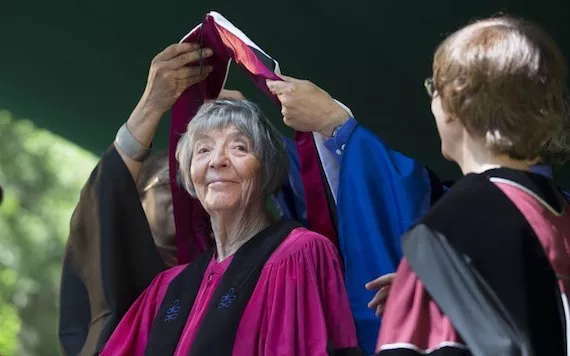President Chopp's Charge to Barbara Norfleet '47

Barbara Norfleet, you are a renowned documentary photographer, retired senior lecturer in Visual and Environmental Studies at Harvard, and retired curator of the Carpenter Center for the Visual Arts there. Trained as a social scientist, you discovered a passion for photography and enjoyed a long and distinguished career exploring American social history via photography. You were one of the first to bring professional training as a sociologist to the study of photographs of everyday life. And your own work as a documentary photographer has been exhibited and celebrated in numerous museums.
You grew up in the Philadelphia area and came to Swarthmore in the early '40s. You majored in economics and graduated with High Honors in 1947, and went on to attend graduate school in a Radcliffe-Harvard program, where you earned a Ph.D. in social relations in psychology in 1951. After serving briefly as a research associate, you began a 20-year teaching career at Harvard, first as a lecturer in Social Sciences and then in Visual and Environmental Studies. In the mid-'60s, you took a photography course at the Carpenter Center, and this led you to embark on a dual career as photographer and photographic curator and scholar.
Your training in sociology enabled you to see the value in a type of photography that no one had paid serious attention to before - the work of professional photographers hired to document everyday events like weddings, beauty pageants, society balls, and local business openings. You understood that these photographers had created social and cultural documents that offered both commentary and critique of modern American life.
In 1969, you began teaching a newly conceived course, Photography as Social Description. There were originally 12 places allotted to that class, but 170 students showed up to the first meeting, causing a near riot. The course became one of the most popular ever taught at Harvard. In 1972, you became Curator of Photography at the Carpenter Center and began traveling across the country, culling forgotten prints and negatives from the attics and basements of professional studios that were active from the 1930s to the '60s. In this important quest, you saved thousands of documentary photographs that would otherwise have been lost. You also began a long career of publishing your own photographs documenting American culture in the latter half of the 20th century.
You have published numerous articles and books on photography and its importance in documenting the details of everyday life, including, among others, The Champion Pig (1979), Killing Time (1982), All the Right People (1986), Illusion of Orderly Progress (1999) and When We Liked Ike: Looking for Postwar America (2001). Your own photographs appear in many collections, including the Museum of Modern Art, the Whitney Museum of American Art, the San Francisco Museum of Modern Art, the Boston Museum of Fine Arts, and the George Eastman House.
Among your many awards as an artist, teacher, and curator are a Massachusetts Artists Fellowship, a Guggenheim Fellowship, and a National Endowment for the Arts Fellowship in Photography. You were also Honoree of the Fifth National Women in Photography Conference.
Barbara Norfleet, your work as a teacher, photographer, curator, and writer has broadened the horizons of both sociology and photography. Through your photographs and those of others, you have brought to public attention a complex and moving vision of 20th century American life. You have given us photographs that enable us to see the rich fabric of modern life.
Upon the recommendation of the faculty, and by the power vested in me by the Board of Managers of Swarthmore College and the Commonwealth of Pennsylvania, I have the honor to bestow upon you the degree of Doctor of Arts.



